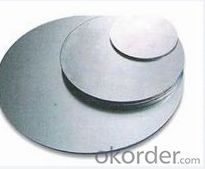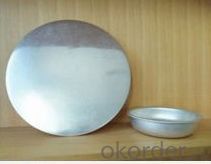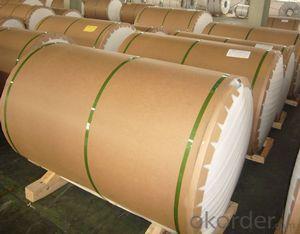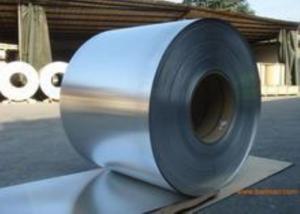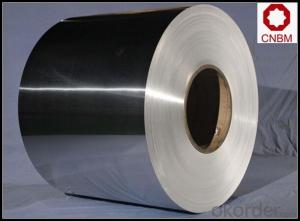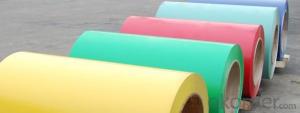Trane All Aluminum Coil with Diameter 720mm 0.5mm Aluminium Circles
- Loading Port:
- Shanghai
- Payment Terms:
- TT OR LC
- Min Order Qty:
- 20 m.t.
- Supply Capability:
- 5000000 m.t./month
OKorder Service Pledge
Quality Product, Order Online Tracking, Timely Delivery
OKorder Financial Service
Credit Rating, Credit Services, Credit Purchasing
You Might Also Like
supply Mill-finished / coated aluminum circles /sheet/ coil:
Alloy: AA1050,1060,1100,1200,2024,3003,3304,3005,3015,5052,5086,5754,5083,6061,7050,7475,8011, etc
Temper: O, H14/16/18/22/24/32/ H112/H321/T6,T851,T7451,T7351, etc
Thickness: 0.02mm—20mm
Width: 100mm—2000mm (Can be slitted)
Notice: PE coating / PVDF coating / Embossment can be done if required.
- Q: Are aluminum coils suitable for outdoor signage and displays?
- Yes, aluminum coils are suitable for outdoor signage and displays. Aluminum is a highly durable and weather-resistant material, making it an excellent choice for outdoor applications. It is known for its ability to withstand extreme temperature variations, UV rays, moisture, and corrosion. Aluminum coils are lightweight, yet strong, which makes them easy to handle and install. They are also versatile and can be easily shaped and formed into various sizes and designs. In addition, aluminum has excellent printability, allowing for vibrant and long-lasting graphics. Overall, aluminum coils provide a reliable and cost-effective solution for outdoor signage and displays.
- Q: Can aluminum coils be used for pharmaceutical packaging?
- Yes, aluminum coils can be used for pharmaceutical packaging. Aluminum is a popular choice for packaging in the pharmaceutical industry due to its excellent barrier properties, light weight, and resistance to corrosion. It provides a protective and hygienic environment for pharmaceutical products, ensuring their safety and extending their shelf life.
- Q: The user is asking if there are any recycling programs specifically for aluminum coil in their country.
- <p>Yes, many countries have recycling programs for aluminum coil. These programs aim to collect and recycle aluminum coils to reduce waste and conserve resources. The availability and specifics of these programs can vary by country, so it's best to check with local waste management authorities or recycling centers for information on programs in your area. Some countries also have legislation mandating recycling of certain materials, including aluminum, to encourage participation and reduce environmental impact.</p>
- Q: How do aluminum coils contribute to recyclability in the construction industry?
- Aluminum coils contribute to recyclability in the construction industry by being made from a highly recyclable material. These coils can be easily melted down and reused to create new aluminum products, reducing the demand for virgin materials and minimizing waste. Additionally, aluminum coils are lightweight, making them more energy-efficient to transport and install, further reducing their environmental impact.
- Q: Is it safe and effective to use aluminum coils for baking purposes?
- <p>Aluminum coils are generally not recommended for baking. While aluminum is a good conductor of heat and is used in some baking pans, using aluminum coils directly in baking can lead to uneven heating and potential health concerns due to the leaching of aluminum into the food. It's better to use materials specifically designed for baking, such as silicone or metal baking sheets, which are safe and provide even heat distribution.</p>
- Q: Are aluminum coils suitable for electrical conductors?
- Aluminum coils, indeed, prove to be suitable for electrical conductors. Due to its remarkable electrical conductivity, aluminum has become a widely utilized material in the electrical industry. It possesses approximately 61% conductivity in comparison to copper, the utmost commonly employed metal for electrical conductors. Lightweight, cost-effective, and possessing good thermal conductivity, aluminum coils have become a favored selection for a range of electrical applications. Nonetheless, it is noteworthy that aluminum has a lower tensile strength than copper, thus potentially demanding a larger cross-sectional area to attain an equivalent level of current carrying capacity. Furthermore, to prevent oxidation and guarantee efficient electrical conductivity in aluminum coils, it is imperative to employ proper insulation and connectors.
- Q: What are the different surface treatment options available for aluminum coils?
- There are several surface treatment options available for aluminum coils, each serving different purposes and providing unique benefits. Some of the commonly used surface treatment options include: 1. Anodizing: Anodizing is an electrochemical process that creates a protective oxide layer on the surface of the aluminum coil. This treatment enhances corrosion resistance, improves durability, and allows for coloring options. 2. Painting: Painting the aluminum coil provides an aesthetic finish while also protecting it from corrosion. The coil can be coated with various types of paints, such as polyester, epoxy, or polyurethane, depending on the desired appearance and level of protection required. 3. Powder Coating: Powder coating involves applying a dry powder to the aluminum coil's surface and then curing it with heat. This process creates a durable and attractive finish that is resistant to chipping, scratching, and fading. Powder coating also offers a wide range of color options and can be used in various applications. 4. Brushing: Brushing the aluminum coil creates a brushed or satin finish with visible linear patterns. This treatment is commonly used for decorative purposes, giving the coil a unique and visually appealing appearance. 5. Laminating: Laminating involves bonding a protective layer, such as a PVC film or a polyester film, onto the surface of the aluminum coil. This treatment provides additional protection against scratches, abrasion, and UV radiation while also offering customization options. 6. Chemical Conversion Coating: Chemical conversion coating, also known as chromate conversion coating, involves applying a thin layer of chromate onto the aluminum coil's surface. This treatment enhances corrosion resistance, improves paint adhesion, and provides a base for subsequent painting or powder coating. It is important to choose the appropriate surface treatment option based on the specific requirements of the application, such as durability, corrosion resistance, aesthetics, and cost-effectiveness. Consulting with experts in the field can help determine the most suitable treatment option for aluminum coils.
- Q: What is the maximum temperature that aluminum coils can withstand?
- The maximum temperature that aluminum coils can withstand depends on various factors such as the specific alloy composition, thickness, and application. Generally, aluminum coils are known for their excellent heat conductivity and resistance to high temperatures. Most commonly used aluminum alloys, such as 3003 or 5052, can withstand temperatures up to around 300-350 degrees Fahrenheit (150-175 degrees Celsius) without significant deformation or damage. However, it is important to note that exceeding this temperature range can cause the aluminum coils to lose their structural integrity, resulting in distortion, melting, or even combustion. Additionally, prolonged exposure to high temperatures can also lead to a reduction in the overall strength and performance of the aluminum coils. Therefore, it is crucial to consult the manufacturer's specifications and guidelines for the specific aluminum alloy and application in question to determine the maximum temperature limit that the coils can withstand safely.
- Q: This question asks about the impact of aluminum coils on safety and health protection during welding processes.
- <p>Aluminum coils can significantly affect welding safety and health protection due to their unique properties. Aluminum is lighter than steel and conducts heat quickly, which can lead to faster heat transfer to the welder, increasing the risk of burns. Additionally, aluminum welding produces fumes that contain aluminum oxide, which can be harmful if inhaled over time, potentially causing respiratory issues or even neurological damage. Welders must use proper ventilation and respiratory protection to mitigate these risks. Moreover, aluminum's high reflectivity can cause intense light exposure, necessitating the use of appropriate eye protection to prevent eye injuries. Overall, aluminum welding requires specific safety measures to protect welders' health and safety.</p>
- Q: This question asks for a brief explanation of the process involved in manufacturing aluminum coils.
- <p>To make aluminum coil, start with high-quality aluminum ingots. These are melted in a furnace and then poured into a casting machine to create a continuous cast strip. This strip is passed through a series of rollers to reduce its thickness and achieve the desired width and thickness. The rollers apply heat and pressure, gradually forming the aluminum into a coil. The coil is then cooled, often using water, and wound onto a mandrel for storage or further processing. Quality control checks are performed throughout the process to ensure the coil meets specific strength, thickness, and surface finish requirements. The final product is a tightly wound aluminum coil ready for use in various industries such as construction, automotive, and packaging.</p>
Send your message to us
Trane All Aluminum Coil with Diameter 720mm 0.5mm Aluminium Circles
- Loading Port:
- Shanghai
- Payment Terms:
- TT OR LC
- Min Order Qty:
- 20 m.t.
- Supply Capability:
- 5000000 m.t./month
OKorder Service Pledge
Quality Product, Order Online Tracking, Timely Delivery
OKorder Financial Service
Credit Rating, Credit Services, Credit Purchasing
Similar products
Hot products
Hot Searches
Related keywords




